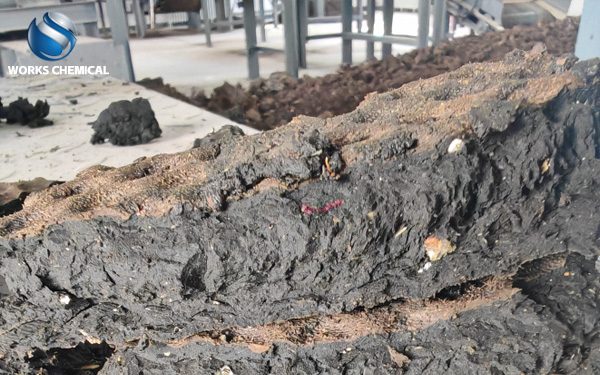
In the process of sludge treatment, the plate and frame filter press is a commonly used dewatering equipment. To enhance the efficiency of sludge dewatering and reduce the moisture content, the application of sludge enhancers has become crucial. The following is a detailed analysis of the sludge pressing effect of the plate and frame filter press after adding the sludge efficiency enhancer:

The function of sludge enhancer
Sludge enhancer is a kind of chemical agent specifically used to improve the dewatering performance of sludge. Its main components include inorganic compounds, sludge surface structure modifiers, degreasing agents, cell wall disruptors, sludge surface treatment agents, sludge stripping agents, etc. These components work together to change the surface structure and properties of sludge, making sludge particles easier to separate and dewater.
The application effect of sludge enhancer in plate and frame Filter press
Reducing the moisture content of sludge: When sludge enhancers are used in combination with plate and frame filter presses, the moisture content of sludge can be reduced from over 90% to 40% to 60%, or even lower. This deep dewatering effect significantly reduces the volume and weight of sludge and increases the sludge recovery rate.
Improving dewatering efficiency: Sludge enhancers can enhance the fluidity of sludge, making it easier to be compressed and dewatered in plate and frame filter presses. This not only shortens the dehydration time but also enhances the processing capacity of the plate and frame filter press.
Reduce equipment wear and clogging: The sludge treated with the sludge enhancer does not stick to the filter cloth, reducing the frequency of filter cloth replacement and lowering the maintenance cost of the equipment. Meanwhile, as the fluidity of the sludge has been improved, the risk of equipment blockage has also been reduced.
No corrosive substances need to be added: Traditional sludge treatment chemicals often contain corrosive substances such as lime, which may cause damage to plate and frame filter presses. However, sludge enhancers usually do not require the addition of these corrosive substances, thus protecting the integrity of the equipment.
Precautions for Using Sludge enhancers
Select the appropriate sludge enhancer: Choose the appropriate sludge enhancer based on the nature of the sludge and the treatment requirements. Different sludge enhancers have different chemical compositions and mechanisms of action, so they need to be selected based on specific circumstances.
Control the dosage: The dosage of the sludge enhancer should be adjusted according to the nature of the sludge and the performance of the treatment equipment. Excessive or insufficient dosage may both affect the treatment effect and economy.
Monitor the treatment effect: During the usage process, the dewatering effect of the sludge, moisture content and other indicators should be regularly monitored to ensure the effectiveness of the sludge enhancer.
Pay attention to environmental protection requirements: When choosing and using sludge enhancers, relevant environmental protection regulations and standards should be followed to ensure that the treated sludge meets environmental protection requirements. Conclusion After adding sludge enhancers to the plate and frame filter press, the sludge pressing effect has been significantly improved. Sludge enhancers reduce the moisture content of sludge by altering its surface structure and properties, enhance dewatering efficiency, and minimize equipment wear and clogging. Meanwhile, the use of sludge enhancers does not require the addition of corrosive substances, thus protecting the integrity of the equipment. Therefore, in the sludge treatment process, it is recommended to use sludge enhancers in combination with plate and frame filter presses to achieve a more efficient sludge dewatering effect.